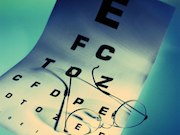University graduate would be ≥−1 dioptre more myopic than someone leaving school at 16
THURSDAY, June 7, 2018 (HealthDay News) — More time spent in education seems to be a causal risk factor for myopia, according to a study published online June 6 in The BMJ.
Edward Mountjoy, Ph.D., from the University of Bristol in the United Kingdom, and colleagues conducted a bidirectional, two sample mendelian randomization study using publicly available genetic data. Participants included 67,798 men and women in the U.K. Biobank cohort with information for years of completed education and refractory error. Mendelian randomization analyses were performed in two directions; the first exposure was genetic predisposition to myopia, measured with 44 genetic variants, with years in education as the outcome, and the second exposure was genetic predisposition to higher levels of education, measured with 69 genetic variants, with refractory error the outcome.
The researchers found that each additional year of education correlated with a more myopic refractive error of −0.18 dioptres/year in conventional regression analyses of the observational data. The true causal effect was suggested to be even stronger in Mendelian randomization analyses (−0.27 dioptres/year). Little evidence was found to suggest that myopia affected education. A U.K. university graduate with 17 years of education would be at least −1 dioptre more myopic, on average, than someone who left school at age 16 with 12 years of education.
“This study shows that exposure to more years in education contributes to the rising prevalence of myopia,” the authors write.
Copyright © 2018 HealthDay. All rights reserved.








